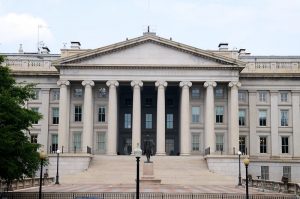The United States, United Kingdom, and Canada have all imposed additional sanctions on Myanmar’s military junta, tightening restrictions on economic dealings with the coup government that seized power on February 1.
Most significant were those sanctions announced by the U.S., which designated one entity and 13 more individuals responsible for orchestrating the coup and subsequent bloody crackdown on the civilian population.
In a statement, the U.S. Department of Treasury’s Office of Foreign Assets Control (OFAC), announced sanctions against the State Administration Council (SAC), as the junta refers to itself, accusing it of the “unlawful overthrow of the democratically elected civilian government.”
In addition to the SAC itself, OFAC designated four members of the SAC and nine military-appointed cabinet members, including the governor of the central bank and the ministers of commerce and planning and finance. OFAC also sanctioned three adult children of previously designated military officials.
In a statement announcing the measures, Secretary of State Antony Blinken said that the move came in response to the military government’s “continued violence and repression against the people of Burma.” In particular, he cited the recent siege of Mindat, in Chin State, in which the junta deployed heavy artillery and helicopter gunships to dislodge a civilian militia that had taken control of the town.
Promising that the U.S. will “continue to promote accountability for those responsible for the coup,” Blinken also called on all countries to consider imposing measures such as arms embargos and to cease all interaction with military-owned entities.
“Our actions today underscore our resolve and that of our partners to apply political and financial pressure on the regime as long as it fails to stop violence and take meaningful action to respect the will of the people,” he said.
Also yesterday, Canada imposed sanctions on 16 individuals and 10 entities connected to the Myanmar armed forces, or Tatmadaw, and the U.K. announced sanctions against the state-owned Myanmar Gems Enterprise, which the U.S. sanctioned last month.
The parallel announcement was just the latest in a string of graduated Western sanctions against the junta, which have included a host of senior military commanders two military-controlled conglomerates that funnel money into the military’s coffers, and other military-linked enterprises.
The coordinated move comes nearly four months after the military power, touching off nationwide protests and work stoppages, inflaming ethnic conflicts, and prompting intensifying crackdowns by the security forces that have now killed more than 800 people.
In an emailed briefing on the latest round of sanctions, the U.S.-ASEAN Business Council (USABC) said that the U.S. listing of civilian ministers marked “a significant departure from an earlier U.S. position of keeping designations targeted at active or former military officials.”
While most of the SAC and its cabinet have now been sanctioned by the U.S. government, the Council predicted that the remaining civilian ministers, potentially including the Minister of Electricity and Energy and the Minister of Investment and Foreign Economic Relations, “can be expected to follow suit.”
Citing sources in the U.S. government, USABC also hinted that the next targets for U.S. sanctions could be the Myanmar Oil and Gas Enterprise (MOGE), which earns the military billions of dollars annually, as well as a number of the country’s state-owned financial institutions.
The sanctions announcements made today signal a coordinated effort among Western nations to address the situation in Myanmar. As long as the junta continues on its present course, they are likely to be followed by further sanctions of key military figures and SAC-linked entities by Western powers, including the European Union.
It is unlikely whether the intensifying pressure will force the Tatmadaw to back down, given its seeming indifference to outside opinion, passive support from China and Russia, and the “nearly sanction-proof” nature of the illicit economy from which the military draws considerable revenues. Along with the ongoing protests and strikes in Myanmar, however, these sanctions are likely to make any return to normality almost impossible for the foreseeable future.

































